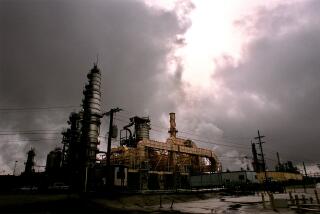OPEC Urged to Impose Quotas
- Share via
NICOSIA, Cyprus — Iraq wants no further increases in OPEC oil output or any increases in members’ production quotas until prices climb to $25 per barrel, the Middle East Economic Survey said Monday.
The authoritative newsletter said the idea was likely to meet considerable resistance among key producers when they meet in Geneva Thursday. But it said there was a consensus within OPEC to restore oil prices to more than $18 per barrel. World prices are now just below OPEC’s $18 benchmark.
An Iranian plan to raise the minimum price to $20 per barrel and then cut OPEC’s output ceiling and quotas if this is not reached by October stood a good chance of being accepted, it added.
The Geneva talks will probably maintain existing quotas for 12 of the 13 members of the Organization of Petroleum Exporting Countries, while allocating a formal quota of 1.5 million barrels per day for the United Arab Emirates, making a total ceiling of 22.491 million barrels per day, MEES said.
This is the formula agreed by five Gulf Arab producers, including Iraq, in Jeddah two weeks ago.
The quotas would be maintained until prices rise above $18 per barrel or possibly higher if the Geneva conference agreed to raise the minimum reference target. But this was as far as the consensus went, MEES said.
“The question of where the price would have to reach and for how long in order to justify consideration of an increase in the ceiling and quotas, has been left open and there are evidently considerable differences of opinion on this score,” the newsletter said.
Iraq last Tuesday launched a stinging attack on Kuwait and the UAE for overproducing and forcing down oil prices, saying they were part of the U.S.-instigated conspiracy that drove down oil prices by 30% in the first half of this year.
The newsletter said Iraq’s role in pressuring the UAE and Kuwait to cut production was welcomed by most OPEC members, but that there was some dismay over its hard-line tactics.
The Iraqi accusations in the wake of the July 10 Jeddah agreement in which Kuwait and the UAE agreed to drastically cut output stunned conservative Gulf Arab producers.
Iraq--which desperately needs higher oil revenues to fund its post-war reconstruction program--also threatened to take unspecified action against both countries if they produced above their quotas, as they have in the past.
More to Read
Inside the business of entertainment
The Wide Shot brings you news, analysis and insights on everything from streaming wars to production — and what it all means for the future.
You may occasionally receive promotional content from the Los Angeles Times.










